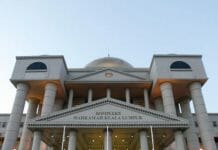The Halal industry is set to expand globally from USD$3.1 trillion in 2018 to USD$5 trillion by 2030, with a similar upward trend from USD$1.6 trillion in 2018 to USD$2.8 trillion in APAC. With an existing demand-supply gap of 80%, manufacturers are looking to expand their Halal production. But how exactly do you begin?
Starting a Halal facility may be a challenge as there are many considerations to be taken into account with the facility design and ensuring that they are compliant with the standards required to fulfill their Halal status. Although there is no specific Halal factory design standard, it is important to maintain adherence to the Halal guidelines that have been set out by in Malaysian Standards and Halal Certification Procedure Manual Malaysia.
These requirements initially demand comprehension by the users. Briefly, the Halal certificate application must only come from a fully legitimate company established in Malaysia although there is a Malaysia Halal certification for international companies. Nevertheless, a preliminary consult with Halal experts will help shed some light. To begin the Halal certification process for a Halal manufacturing facility, It would be best for the company to get opinions and advice from Halal experts on the blueprint/floor plan before setting up the facility. This generally is not something critical but it is encouraged, just in the case says Dhaliff Anuar, Head of Halal Consultancy & Advisory, from Halal Development Corporation (HDC))
To facilitate manufacturers in closing the 80% gap between demand and supply of Halal products, Haskell has formed a partnership with the Halal Development Corporation (HDC) in Malaysia to provide a seamless, one-stop solution for Halal manufacturers. Haskell is a US-based Architecture, Engineering & Construction (AEC) firm with offices across APAC in Malaysia, Singapore, the Philippines, and China. With our in-house capabilities and experience in providing AEC solutions to industrial clients within the Food and Beverage, Consumer Packaged Goods, Aviation & Aerospace markets, combined with HDC’s expertise within the Halal industry, clients can expect a team of experts in designing and building your facility. – (Matthew Schultz, Director of Operations, Haskell APAC).
At the initial stage of site selection, HDC has several accredited Halal Parks for manufacturers to consider. Halal parks are industrial areas dedicated to the community of halal products and halal-related product producers and service providers. In Malaysia, there are 14 Halal parks with HALMAS designation, which is an accreditation issued to Halal park owners who have followed the HDC Designated Halal Park Development Guidelines. Each of them has its advantages in meeting the needs of an investor, which will influence the decision to locate a manufacturing base. Easy access to raw materials and halal products, the availability of halal-knowledge professionals who have gone through training and certification process, and the presence of a one-stop centre service facility for assistance and support are all common key considerations. Furthermore, Malaysia is strategically located in the heart of Southeast Asia, making it a great launching pad for access to regional and international markets. (Ahmad Zulhilmee, Senior Manager Halal Parks Department, from HDC). With the availability of Halal Parks, Haskell will then assist clients with their site selection, depending on their planned halal facility and what would best benefit the client’s overall manufacturing process
To facilitate manufacturers in closing the 80% gap between demand and supply of Halal products, Haskell has formed a partnership with the Halal Development Corporation (HDC) in Malaysia to provide a seamless, one-stop solution for Halal manufacturers. Haskell is a US-based Architecture, Engineering & Construction (AEC) firm with offices across APAC in Malaysia, Singapore, the Philippines, and China. With our in-house capabilities and experience in providing AEC solutions to industrial clients within the Food and Beverage, Consumer Packaged Goods, Aviation & Aerospace markets, combined with HDC’s expertise within the Halal industry, clients can expect a team of experts in designing and building your facility. – (Matthew Schultz, Director of Operations, Haskell APAC).
At the initial stage of site selection, HDC has several accredited Halal Parks for manufacturers to consider. Halal parks are industrial areas dedicated to the community of halal products and halal-related product producers and service providers. In Malaysia, there are 14 Halal parks with HALMAS designation, which is an accreditation issued to Halal park owners who have followed the HDC Designated Halal Park Development Guidelines. Each of them has its advantages in meeting the needs of an investor, which will influence the decision to locate a manufacturing base. Easy access to raw materials and halal products, the availability of halal-knowledge professionals who have gone through training and certification process, and the presence of a one-stop centre service facility for assistance and support are all common key considerations. Furthermore, Malaysia is strategically located in the heart of Southeast Asia, making it a great launching pad for access to regional and international markets. (Ahmad Zulhilmee, Senior Manager Halal Parks Department, from HDC).
With the availability of Halal Parks, Haskell will then assist clients with their site selection, depending on their planned halal facility and what would best benefit the client’s overall manufacturing process.










